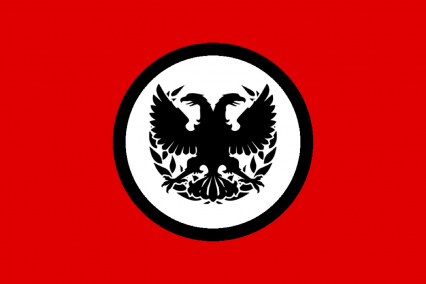The city of Eureka, the capital of the Commonwealth of Mareyland, was becoming an armed camp. It seemed that new groups of soldiers had arrived in the city every hour for the past few days. They were an army of many colors, and informed observers could determine their sort by the uniforms they wore. Men of the National Guard, the federal army, wore jackets of rifle green. A handful of soldiers wore a dark Navy blue, which marked them as members of the Corps of Marines. The majority of the troops wore a cadet gray, the uniform of militias raised by the constituent states of the Commonwealth.
They were armed with an assortment of weapons – the Guardsmen and Marines carried the most modern weaponry, rolling-block breechloaders. The militia troops carried converted muzzle-loaders, older weapons that had been modified with a trapdoor mechanism to allow for breechloading. Many of their weapons were National Guard surplus, replaced by the more modern, purpose-built breechloaders and stacked up in state armories for militia use. The militia was usually called up to deal with incidents of civil disorder, like riots. Riots had been spreading across the Commonwealth lately. Strikes by the railroad workers had inspired strikes by coal miners and other industrial laborers, and the efforts to suppress this worker activism had only inflamed the poor and disaffected people of the cities.
Riots had swept through Eureka itself, and scared President Martin Winslow and his cronies into fleeing across the Carter River and into the neighboring state of Parthenia. His political opponents had wasted no time in impeaching him, for the failure to defend the capital from insurrection. But Winslow had refused to acknowledge the impeachment, and issued a proclamation declaring martial law and proroguing the Senate. So now there were two Presidents in Mareyland, and it seemed that force alone would settle who would remain. Both President Martin Winslow and President pro temper Quincy Addison, newly elected by the Senate, had called for the National Guard and the state militias to muster and put down the opposing government.
General Emmanuel Dewey had accepted responsibility for the defense of the capital, and was busy coordinating the National Guard and militia regiments – mostly from the states of Delmarva, which bordered the federal district of Eureka to the north – that had responded to the Senate’s call. Across the Carter River, General Adolph Vernon had been appointed to command the army of National Guard and state militia, mostly men from Parthenia, which President Martin Winslow intended to use to re-enter the capital, disperse the treasonous Senators, and re-install himself in the Presidential Mansion.
Among the men assembled in the town of New Penzance was Colonel Edward Arlington, commander of a regiment of Parthenia state militia. He and his men had been called up by Governor Henry Radcliff, and sent by railroad to join Winslow’s army. Colonel Arlington’s separation from his home had come at an inopportune moment – he had just married Sarah Ceely, the successful conclusion to a long courtship. The new Lady Arlington despaired to see her husband leave. Her father had died in battle, in a foreign land, and the heartbreak of the loss had left her mother to die a slow death. She feared for her new husband, and wept when he rode away from their plantation home at Woodlawn.
Edward Arlington took a moment of quiet to sit down and pen a letter to his wife. He assured her that he was in good health, and good spirits. He did not tell her about his grave misgivings, or his fears for the performance of his men in battle. They were good men, but not professional soldiers. They were required to muster at infrequent intervals to refresh their skills, but things were calm in Parthenia and they had not needed to muster for anything besides training for years. A few days of drilling in the camp at New Penzance would not turn a collection of farmhands and shopkeepers into skilled men-at-arms. But none of that appeared on the page. Instead, Edward wrote to his wife and told her that he yearned to be home, and surely he would return to Woodlawn soon.







